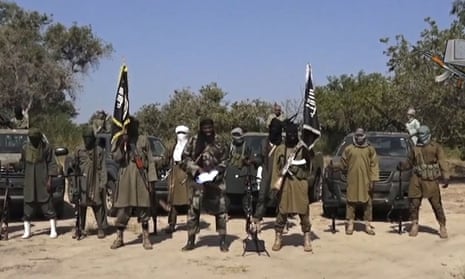At least 100 women and children were reportedly kidnapped and 35 people killed when Boko Haram extremists plundered a remote village in north-east Nigeria .
Survivors said heavily armed militants drove into the village of Gumsuri at dawn, rounded up men and shot them at point-blank range, then forced women and children on to a truck.
There are conflicting reports about the date of the attack. Two witnesses said it occurred on Friday, while other reports said it took place on Sunday.
News of the attack only began to spread when survivors escaped to larger towns in Borno state, Boko Haram’s stronghold.
Gumsuri is about 30 miles from Chibok, where 276 schoolgirls were abducted in April. Since then, kidnappings and raids have continued as Boko Haram has targeted villages surrounded by vast, dry forest in which they have set up camps.
“They came around 4.30am and took away all the women they could lay hands on. Even old women, they were rounding them up,” said Mohammed, a resident who escaped once the gunfire had subsided. He said vigilantes armed with homemade guns tried to hold off the militants.
Lawal, a Chibok resident who drove past Gumsuri two days after the attack, said around half the town had been razed. “I have to hope and believe that the soldiers stationed in Chibok didn’t know this attack was happening. There are enough of them in Chibok to have dealt with the situation if they had known,” he said.
A security source told Reuters that more than 100 people had been abducted and 35 killed, including the district head. Another source confirmed the attack had taken place but claimed dozens of hostages escaped when the air force strafed the extremists’ departing convoys. The government has made no official comment.
Violence in Chibok has subsided after repeated attacks forced the government to post well-armed soldiers around the town. “Chibok is safe these days, but almost every other village has been attacked since. It is having a really devastating psychological impact on surrounding villages,” Lawal said.
On Wednesday 54 Nigerian soldiers were sentenced to death by firing squad for refusing to fight Boko Haram. The soldiers, who were tried in a closed-door military tribunal, were found guilty of mutiny after refusing to help recapture three remote north-eastern towns seized in October.
Spread thin across vast swaths of Nigeria’s semi-arid north-east, soldiers have long complained that they are under-resourced and under-equipped to adequately fight the militants. A further 35 soldiers are still on trial for offences including mutiny, assault, absconding and disorderly behaviour. Nigeria’s army has faced repeated allegations of rights abuses, including summary executions, rape and pillage – charges which authorities deny.
The ongoing attacks have spilled over into Cameroon, prompting the country to consider reintroducing the death penalty for terrorism. This month Cameroon deployed 850 soldiers to help fight the militants.
